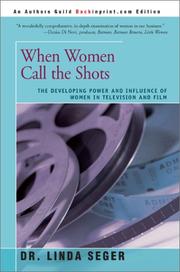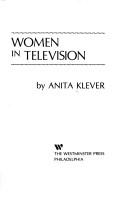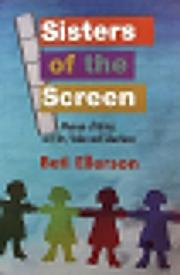| Listing 1 - 10 of 18 | << page >> |
Sort by
|

ISBN: 0802138322 9780802138323 Year: 2004 Publisher: New York (N.Y.) Grove
Abstract | Keywords | Export | Availability | Bookmark
 Loading...
Loading...Choose an application
- Reference Manager
- EndNote
- RefWorks (Direct export to RefWorks)
Angels --- Women in television broadcasting --- Young women --- Dublin (Ireland)

ISBN: 0595268382 9780595268382 Year: 2003 Publisher: New York iUniverse
Abstract | Keywords | Export | Availability | Bookmark
 Loading...
Loading...Choose an application
- Reference Manager
- EndNote
- RefWorks (Direct export to RefWorks)
Record numbers of women are working in all areas of the film and television industries. Actresses are creating their own production companies in order to obtain better roles and more control of their material. Women are creating TV shows to explore stories that more closely reflect their lives. There are more films about women and women's issues, and more money-making films with women protagonists. Change is occurring at every level, and women are clearly having an impact that is reshaping the entertainment industry and the product it delivers. Who better to tell of these changes than script consultant and author Linda Seger. Through interviews with key players such as Sherry Lansing, Dawn Steel, Gillian Armstrong, Marlo Thomas, Linda La Plante, Nora Ephron, Liv Ullman, Loretta Young, Jane Wyman, and many, many others, she shows just what a woman's influence means in what we see - and what we will see much more of in the years ahead - in movie theaters and on our TV screens and how, in turn, that power affects society.
Book
ISBN: 1315511231 131551124X 1315511258 Year: 2018 Publisher: Abingdon, Oxon ; New York : Routledge,
Abstract | Keywords | Export | Availability | Bookmark
 Loading...
Loading...Choose an application
- Reference Manager
- EndNote
- RefWorks (Direct export to RefWorks)
"This book seeks to interrogate the representation of Black women in television. Cheers explores how the increase of Black women in media ownership and creative executive roles (producers, showrunners, directors and writers) in the last 30 years affected the fundamental cultural shift in Black women's representation on television, which in turn parallels the political, social, economic and cultural advancements of Black women in America from 1950 to 2016. She also examines Black women as a diverse television audience, discussing how they interact and respond to the constantly evolving television representation of their image and likeness, looking specifically at how social media is used as a tool of audience engagement."--Provided by publisher.

ISBN: 0664325793 Year: 1975 Publisher: Philadelphia (Pa.): Westminster press
Abstract | Keywords | Export | Availability | Bookmark
 Loading...
Loading...Choose an application
- Reference Manager
- EndNote
- RefWorks (Direct export to RefWorks)
Explores the various positions and opportunities available for women working in television and quotes thirty-seven individuals on their experiences in the field.
Television --- Women in television broadcasting --- Television broadcasting --- Vocational guidance --- Juvenile literature
Book
ISBN: 0520399307 Year: 2024 Publisher: Berkeley, CA : University of California Press,
Abstract | Keywords | Export | Availability | Bookmark
 Loading...
Loading...Choose an application
- Reference Manager
- EndNote
- RefWorks (Direct export to RefWorks)
A free ebook version of this title is available through Luminos, University of California Press's Open Access publishing program. Visit www.luminosoa.org to learn more. In this deeply archival work, Jennifer S. Clark explores the multiple ways in which women's labor in the American television industry of the 1970s furthered feminist ends. Carefully crafted around an impressive assemblage of interviews and primary sources (from television network memos to programming schedules, production notes to executive meeting agendas), Clark tells the story of how women organized in the workplace to form collectives, affect production labor, and develop reform-oriented policies and philosophies that reshaped television behind the screen. She urges us to consider how interventions, often at localized levels, can collectively shift the dynamics of a workplace and the cultural products created there.
Book
ISBN: 9282571742 9282571750 9282571769 9282571777 Year: 1987 Publisher: Luxembourg Office for official publications of the European communities
Abstract | Keywords | Export | Availability | Bookmark
 Loading...
Loading...Choose an application
- Reference Manager
- EndNote
- RefWorks (Direct export to RefWorks)
Book
ISBN: 9780415842341 Year: 2016 Publisher: London : Routledge,
Abstract | Keywords | Export | Availability | Bookmark
 Loading...
Loading...Choose an application
- Reference Manager
- EndNote
- RefWorks (Direct export to RefWorks)
Noires --- Women in television broadcasting --- Black people in television broadcasting --- À la télévision --- Histoire. --- À la télévision

ISBN: 0701173807 0701174110 Year: 2002 Publisher: London Chatto and Windus
Abstract | Keywords | Export | Availability | Bookmark
 Loading...
Loading...Choose an application
- Reference Manager
- EndNote
- RefWorks (Direct export to RefWorks)

ISBN: 0865437130 Year: 2000 Publisher: Trenton (N.J.) : Africa world press,
Abstract | Keywords | Export | Availability | Bookmark
 Loading...
Loading...Choose an application
- Reference Manager
- EndNote
- RefWorks (Direct export to RefWorks)
Book
ISBN: 9781780769769 1780769768 9781350240070 1350240079 Year: 2021 Publisher: London ; New York, NY : Bloomsbury Academic,
Abstract | Keywords | Export | Availability | Bookmark
 Loading...
Loading...Choose an application
- Reference Manager
- EndNote
- RefWorks (Direct export to RefWorks)
"Between the nineteenth century and the mid-twentieth century television transformed from an idea to an institution. In Gender and Early Television, Sarah Arnold traces women's relationship to the new medium of television across this period in the UK and USA. She argues that women played a crucial role in its development both as producers and as audiences long before the 'golden age' of television in the 1950s. Beginning with the emergence of media entertainment in the mid-nineteenth century and culminating in the rise of the post-war television industries, Arnold claims that, all along the way, women had a stake in television. As keen consumers of media, women also helped promote television to the public by performing as 'television girls'. Women worked as directors, producers, technical crew and announcers. It seemed that television was open to women. However, as Arnold shows, the increasing professionalisation of television resulted in the segregation of roles. Production became the sphere of men and consumption the sphere of women. While this binary has largely informed women's role in television, through her analysis, Arnold argues that it has not always been the case"--
| Listing 1 - 10 of 18 | << page >> |
Sort by
|

 Search
Search Feedback
Feedback About UniCat
About UniCat  Help
Help News
News